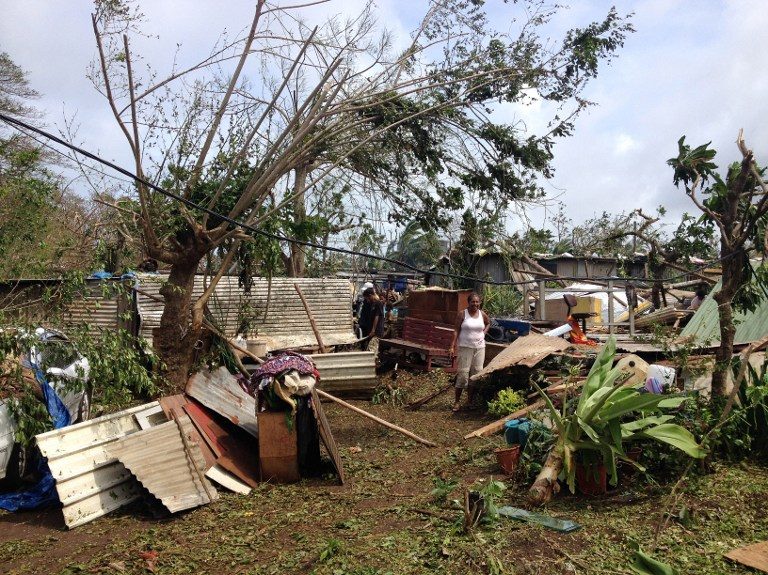SUMMARY
This is AI generated summarization, which may have errors. For context, always refer to the full article.

SUVA, Fiji – Cyclone-devastated Vanuatu declared a state of emergency Sunday, March 15, as relief agencies scrambled to get help to the remote Pacific nation amid reports entire villages were “blown away” when a monster storm swept through.
The official death toll in the capital Port Vila stood at 6 on Sunday, although aid workers said this was likely just a fraction of the fatalities nationwide, with communications still down across most of the archipelago’s 80 islands.
The government said it was still trying to assess the scale of the disaster unleashed when Super Cyclone Pam, a maximum Category 5 system, vented its fury on Friday night, with winds reaching 320 kilometers (200 miles) an hour.
The UN had unconfirmed reports that Super Cyclone Pam had killed 44 people in one province alone and Oxfam said the destruction in Port Vila was massive, with 90% of homes damaged.
“This is likely to be one of the worst disasters ever seen in the Pacific, the scale of humanitarian need will be enormous… entire communities have been blown away,” said Oxfam’s Vanuatu director Colin Collet van Rooyen.
“People have completely amazed me,” he added. “I’ve seen people walk away from totally destroyed houses and help others.”
Vanuatu’s President Baldwin Lonsdale described the storm as “a monster that has devastated our country”, his voice breaking as he described Port Vila’s devastation.
“Most of the buildings have been destroyed, many houses have been destroyed, school, health facilities have been destroyed,” he told the BBC from Japan, where he was attending a disaster management conference when the cyclone hit.
Aid workers described destroyed homes, uprooted trees and blocked roads following what UNICEF spokeswoman Alice Clements said was “15-30 minutes of absolute terror” as the cyclone barrelled into the island.
“People have no water, they have no power, this is a really desperate situation right now. People need help,” she told Agence France-Presse.
Clements said most of the dwellings on Port Vila’s outskirts, largely tin shacks, stood no chance.
“People tried to tie down their roofs, they put bricks on them, but it’s total destruction, they’ve been absolutely flattened,” she said.
“I was talking to people who were sheltering in a church. It was destroyed and they had to run for their lives.
“People are collecting the fruit that’s been blown on the ground, then they’ll go onto their root crops and after that they’ve got no food.”
Oxfam’s executive director Helen Szoke said it was a “worse than worst case scenario”, while World Vision spokeswoman Chloe Morrison said the situation appeared grim for the outlying islands in the nation of 275,000.
“We’re seeing whole villages and houses blown away,” she said.
Disease fears
Save the Children’s head of humanitarian response Nichola Krey raised fears of food shortages in the subsistence economy and said conditions in evacuation centres were challenging.
“Many of the evacuation centres have lots of women and young children sleeping cheek-by-jowl, so health and protection will by key in the coming weeks,” she said.
Clements said the hospital had also been flooded and most of its medical supplies were compromised.
Despite the problems, relief began to trickle in on Sunday, a day after Vanuatu’s president Lonsdale made an emotional call for international aid at the Japan conference.
Port Vila’s airport was repaired sufficiently to allow an Australian air force plane to land with supplies of food shelter and medicine.
A New Zealand air force place also flew in supplies to neighbouring Tuvalu, where Prime Minister Enele Sopoaga said 45 percent of the 11,000 population had been displaced.
“We are worried about the aftermath in terms of hygiene and supplies of essential materials like food, medicine and water,” Sopoaga told Radio New Zealand after declaring a state of emergency.
NGOs have launched public appeals while governments around the globe pledged relief funding including $3.8 million from Australia, $2.9 million from Britain, $1.8 million from New Zealand and $1.05 million from the European Union.
France was also sending flights from its Pacific territory of New Caledonia and ordered the frigate Vendemiaire to sail from Noumea so it can help assess the scale of the damage.
New Caledonia High Commissioner Paul-Marie Claudon said it was part of a coordinated response under which France would carry out damage assessment while Australia and New Zealand concentrated on humanitarian relief.
“A disaster of this magnitude has not been experienced by Vanuatu in recent history — particularly in terms of the reach of the potential damage and the ferocity of the storm,” said Sune Gudnitz, who heads the United Nations Office for the Coordination of Humanitarian Affairs in the Pacific. – Rappler.com
Add a comment
How does this make you feel?
There are no comments yet. Add your comment to start the conversation.